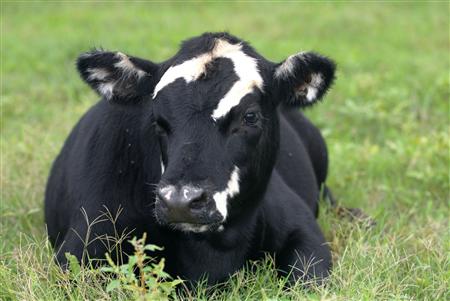K.C., the first animal produced by cloning from a cell taken from a carcass, in an undated photo courtesy of the genomics services company Viagen.
To the untrained eye, Pollard Farms looks much like any other cattle ranch. Similar looking cows are huddled in similar looking pens. But some of the cattle here don't just resemble each other. They are literally identical -- clear down to their genes.
Of the 400-some cattle in Barry Pollard's herd of mostly Black Angus cattle there are 22 clones, genetic copies of some of the most productive livestock the world has ever known.
Pollard, a neurosurgeon and owner of Pollard Farms, says such breeding technology is at the forefront of a new era in animal agriculture. "We're trying to stay on the very top of the heap of quality, genetically, with animals that will gain well and fatten well, produce well and reproduce well," Pollard told a reporter during a recent visit to his farm.
The U.S. Food and Drug Administration in 2008 approved the sale of food from clones and their offspring, stating the products are indistinguishable from that of their non-clone counterparts. Japan, the European Union, and others have followed suit.
The moves have stirred controversy about whether tinkering with nature is safe, or even ethical, prompting major food companies to swear off food products from cloned animals. But consumers are likely already eating meat and drinking milk from the offspring of clones, which are technically not clones, without even knowing it.
Farmers can now use cloning and other assisted breeding technologies to breed cows that produce bigger, better steaks or massive amounts of milk, and animals that resist diseases or reproduce with clockwork precision. Premier genes can translate to improved feeding efficiency, meaning the ability to convert the least amount of feed into the most meat or milk, which results in a smaller environmental footprint.
via NewsDaily: Welcome to the Clone Farm.
The back up Blog of the real Xenophilius Lovegood, a slightly mad scientist.
Monday, November 16, 2009
Welcome to the Clone Farm
Subscribe to:
Post Comments (Atom)

No comments:
Post a Comment